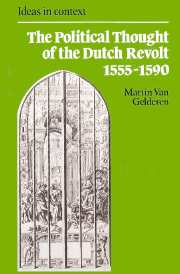Book contents
- Frontmatter
- Contents
- Preface
- List of abbreviations
- 1 Introduction
- 2 The Dutch Revolt: historical contexts
- 3 Religion and resistance: the case of Reformed Protestantism
- 4 Politics and resistance: the political justification of the Dutch Revolt
- 5 From revolt to republic: the quest for the best state of the commonwealth (1578–1590)
- 6 Politics and religion (1572–1590): the debates on religious toleration and the substance of liberty
- 7 Conclusions: the Dutch Revolt and the history of European political thought
- Appendix: a note on primary sources
- Bibliography
- Index
- IDEAS IN CONTEXT
1 - Introduction
Published online by Cambridge University Press: 15 December 2009
- Frontmatter
- Contents
- Preface
- List of abbreviations
- 1 Introduction
- 2 The Dutch Revolt: historical contexts
- 3 Religion and resistance: the case of Reformed Protestantism
- 4 Politics and resistance: the political justification of the Dutch Revolt
- 5 From revolt to republic: the quest for the best state of the commonwealth (1578–1590)
- 6 Politics and religion (1572–1590): the debates on religious toleration and the substance of liberty
- 7 Conclusions: the Dutch Revolt and the history of European political thought
- Appendix: a note on primary sources
- Bibliography
- Index
- IDEAS IN CONTEXT
Summary
PRELIMINARY
On 26 July 1581 the States General of the United Provinces in the Netherlands passed a resolution which declared Philip II, King of Spain, Duke of Brabant, Duke of Guelders, Count of Flanders, Count of Holland and Zeeland, Lord of Friesland etc. forfeited of his sovereignty over the provinces. The resolution, better known as the Act of Abjuration, ascertained that, ‘despairing of all means of reconciliation and left without any other remedies and help’, the States had been forced
in conformity with the law of nature and for the protection of our own rights and those of our fellow countrymen, of the privileges, traditional customs and liberties of the fatherland, the life and honour of our wives, children and descendants so that they should not fall into Spanish slavery – to abandon the King of Spain and to pursue such means as we think likely to secure our rights, privileges and liberties.
Like many resolutions of the States General, the Act of Abjuration was the outcome of a lengthy decision-making process, marked by discussion and bargaining, slowness and carefulness. A so-called ‘committee of conciliation’ had prepared the Act, and all provinces had been asked to give their opinion on the question of relinquishing Philip II. Many had cautioned against provocation.
- Type
- Chapter
- Information
- The Political Thought of the Dutch Revolt 1555–1590 , pp. 1 - 12Publisher: Cambridge University PressPrint publication year: 1992

